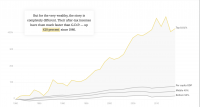NY Times discovers inequality
A few days ago, I read the article America Will Struggle After Coronavirus. These Charts Show Why. by David Leonhardt and Yaryna Serkez (NY Times), which has very nice charts showing a gaping inequality chasm in the United States. It’s really nicely done and drives the point home in a way not often discussed so openly in the mainstream media.
 420% income increase for the 0.1%I was honestly wondering what to make of it, simply because I was waiting for the other shoe to drop and for the NY Times to blame Trump and/or Russia for the whole debacle, even though their charts stretch back to the late 70s/early 80s. The U.S. mainstream media are the world champions of “discovering” a real problem but then blaming the wrong suspects, so that anyone who tries to do anything about it ends up fighting windmills rather than the actual giants.[1]
420% income increase for the 0.1%I was honestly wondering what to make of it, simply because I was waiting for the other shoe to drop and for the NY Times to blame Trump and/or Russia for the whole debacle, even though their charts stretch back to the late 70s/early 80s. The U.S. mainstream media are the world champions of “discovering” a real problem but then blaming the wrong suspects, so that anyone who tries to do anything about it ends up fighting windmills rather than the actual giants.[1]
I was helped along by the article Thank You, Bernie; Screw You, New York Times by Laura Flanders (CounterPunch), which captured the problem I had with the NYT article perfectly:
“It is the essence of American liberalism to trash radical dreams and then dance on them. And that’s just what the New York Times did the day after Bernie Sanders bowed out of the Democratic race for the nomination. On that day, in a special editorial, the editors of the very same paper that disparaged his every move opined that America is divided and our democracy corrupt and launched a series promising to report on just the sort of transformative policies Sanders advocated.
“[…]
“In the Times’s world, it’s apparently ok to bemoan a society and an economy that privileges the rich over the poor, but it’s unacceptable to run for the presidency on a promise to reverse those priorities. (Emphasis added.)”
That’s it in a nutshell: the progressive pose in the United States can never be anything more than that, because the only ones privileged enough to be able to consider anything other than mere survival necessarily suckle at the teat of the same system that keeps the 99.9% submerged and gasping for breath.
Anyone in that mindset wants to be able to think of themselves as one of the good ones without thinking about how their own lifestyle is predicated on standing on a hill of skulls. How without the giant inequality gap, none of their lives would look anything like they do, that their own talents and skills in no way explain how they consider themselves to be worth $200,000 per year while others struggle on $25,000. For the typical Times reader, this does not bear thinking about because it’s the house of cards on which not only their net worth, but their self-worth, is built.
Laura Flanders is absolutely right to call out the Times for their bullshit in suddenly discovering inequality mere days after they’d just accomplished a year-long task of squashing the only presidential candidate who’d recognized it 50 years ago and had spent every waking moment trying to do something about it. Only once they’d helped make sure that good ol’ boy Joe Biden was going to be the nominee—and that there was no longer a danger of upsetting the status quo that finances not only the Times, but most of its readers—was it safe to go back to pretending to be progressive in earnest.